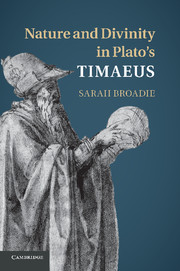Book contents
- Frontmatter
- Contents
- Acknowledgements
- What lies ahead
- Chapter 1 The separateness of the Demiurge
- Chapter 2 Paradigms and epistemic possibilities
- Chapter 3 The metaphysics of the paradigm
- Chapter 4 Immortal intellect under mortal conditions
- Chapter 5 The Timaeus–Critias complex
- Chapter 6 The genesis of the four elements
- Chapter 7 Divine and natural causation
- In conclusion
- Appendix on ‘parts of the paradigm’
- References
- General index
- Index locorum
Chapter 7 - Divine and natural causation
Published online by Cambridge University Press: 05 December 2011
- Frontmatter
- Contents
- Acknowledgements
- What lies ahead
- Chapter 1 The separateness of the Demiurge
- Chapter 2 Paradigms and epistemic possibilities
- Chapter 3 The metaphysics of the paradigm
- Chapter 4 Immortal intellect under mortal conditions
- Chapter 5 The Timaeus–Critias complex
- Chapter 6 The genesis of the four elements
- Chapter 7 Divine and natural causation
- In conclusion
- Appendix on ‘parts of the paradigm’
- References
- General index
- Index locorum
Summary
In the beginning?
In several places in the Timaeus–Critias Timaeus clearly speaks as if the Demiurge made this cosmos ‘once upon a time’. That phrase may not be quite right, since chronological – i.e. measurable – time (chronos) is itself an intended feature of the universe that was constructed. Chronos came into being only when the visible system of circulating celestial bodies was created (37c6–40d5). Even so, the story that unfolds from Timaeus’s first beginning clearly shows a succession of constructive phases, starting with the Demiurge’s ‘taking over’ the pre-cosmic matter (30a3–6; 68e1–4); while in the story that unfolds from the second beginning there is at least one point of demarcation between a phase when the four materials were given their geometric structure, and a phase when the Demiurge proceeded to form them into the cosmos (69b3–c3). And in more than one place Timaeus says simply that the cosmos will come to be or has come to be, as if its not being and its being are related as before and after (34a8–b1; Critias 106a3–4). The picture, then, is of a proto-historical inauguration.
The debate, almost as old as the Timaeus itself, on whether Plato means this ‘literally’ has been governed by its connection with the question of the sempiternity of the world (i.e. its everlastingness in both temporal directions). The view that the cosmos is sempiternal had many adherents from the early Academy onwards, and the Platonists among them – Xenocrates is named in this connection – reconciled their commitments by supposing that the Timaeus account is couched as a proto-historical narrative because the author thought it was easier to teach cosmology that way (didaskalias charin; Aristotle, On the Heaveni. 10, 280a1). This sort of interpretation implies that the proto-historicity is nothing but a presentational device, so that recasting the work in sempiternalist form should leave all its serious content unaffected.
- Type
- Chapter
- Information
- Nature and Divinity in Plato's Timaeus , pp. 243 - 277Publisher: Cambridge University PressPrint publication year: 2011

